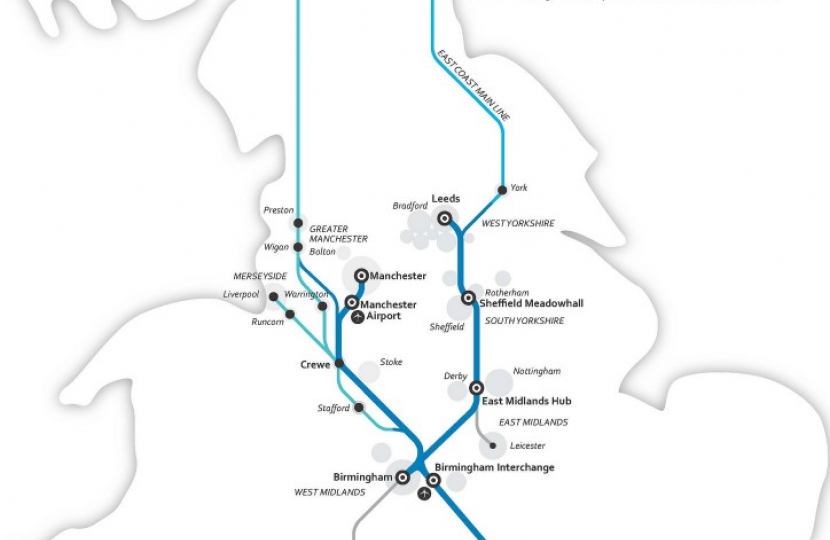
New analysis by KPMG shows that HS2 could boost the country’s economy by £15billion per year and that the regions will be the biggest winners from the project. The report, commissioned by HS2 Ltd, the company developing the new high speed link, also gives a breakdown of the economic benefits for each HS2 city region, with variations in the impact on particular regions depending on assumptions as to the competition between regions and how sensitive businesses are to differences in costs between places. It shows, for example, that HS2 will give the Birmingham city region economy a yearly boost equivalent to 2.1-4.2% of the city region’s GDP. For Manchester city region the figure is 0.8%-1.7%, for Leeds city region, 1.6% and for Greater London 0.5%.
Stephen Mosley MP for Chester said:
“HS2 is a long term, forward looking infrastructure project that has the potential to radically rebalance the British economy and support extra jobs and growth in the North. The West Coast Mainline is already at full capacity and we desperately need new railway infrastructure to cope with the massive increase in rail journeys that have occurred over the past 20 years. This report is another piece of evidence that shows that HS2 is the right solution to boost our economic future and give us a transport network fit for the 21st Century.”
Richard Threlfall, KPMG’s Head for Infrastructure, Building and Construction comments:
“There have been repeated calls for a business case for the HS2 scheme focused on jobs, productivity and growth. KPMG’s analysis forms a key part of that business case, setting out the economic impact across the country of the HS2 scheme. It shows beyond reasonable doubt that HS2 brings net benefits to the country of many times the scheme’s cost. It shows the UK will be £15 billion a year better off with HS2, recovering the cost of the scheme within just a few years.
“Our analysis also shows that HS2 will significantly help counter the corrosive effects on our country of the widening north-south divide. There has been a long-running debate about “who wins” from HS2, the north or the south? The answer is both.”
Drawing on analysis of how connectivity influences productivity and competitiveness today, the KPMG analysis looks at the potential benefits of HS2 in a different way to those captured in more traditional appraisals.
Lewis Atter, KPMG Lead on Infrastructure Strategy comments:
“Our report looks beyond time savings of HS2 to the impact on the real economy in terms of GDP and therefore also tax generated for the Exchequer. Adding £15 billion a year to the UK economy is like creating an economy the size of Cambridgeshire or Oxfordshire, without reducing the size of anywhere else. Given the proportion of GDP that flows to the Exchequer, this means more than £5 billion a year in extra tax receipts, more than enough to cover the long term costs of the project to the taxpayer.
“The work also shows that once the focus is what HS2 can do for the economy, the debate about the ‘lap-top’ effect on the value of time saved on rail turns out to be a red herring. Yes it’s true that because it is possible to use a train a little bit like a mobile office, saving time on a journey isn’t as important as it once was, but it also means that the value of rail connections between places to the economy has gone up and will rise over time. HS2 is not just about speed it is also about new capacity and the ability to provide those “mobile office” benefits to more businesses, between more places and at higher levels of frequency. “
